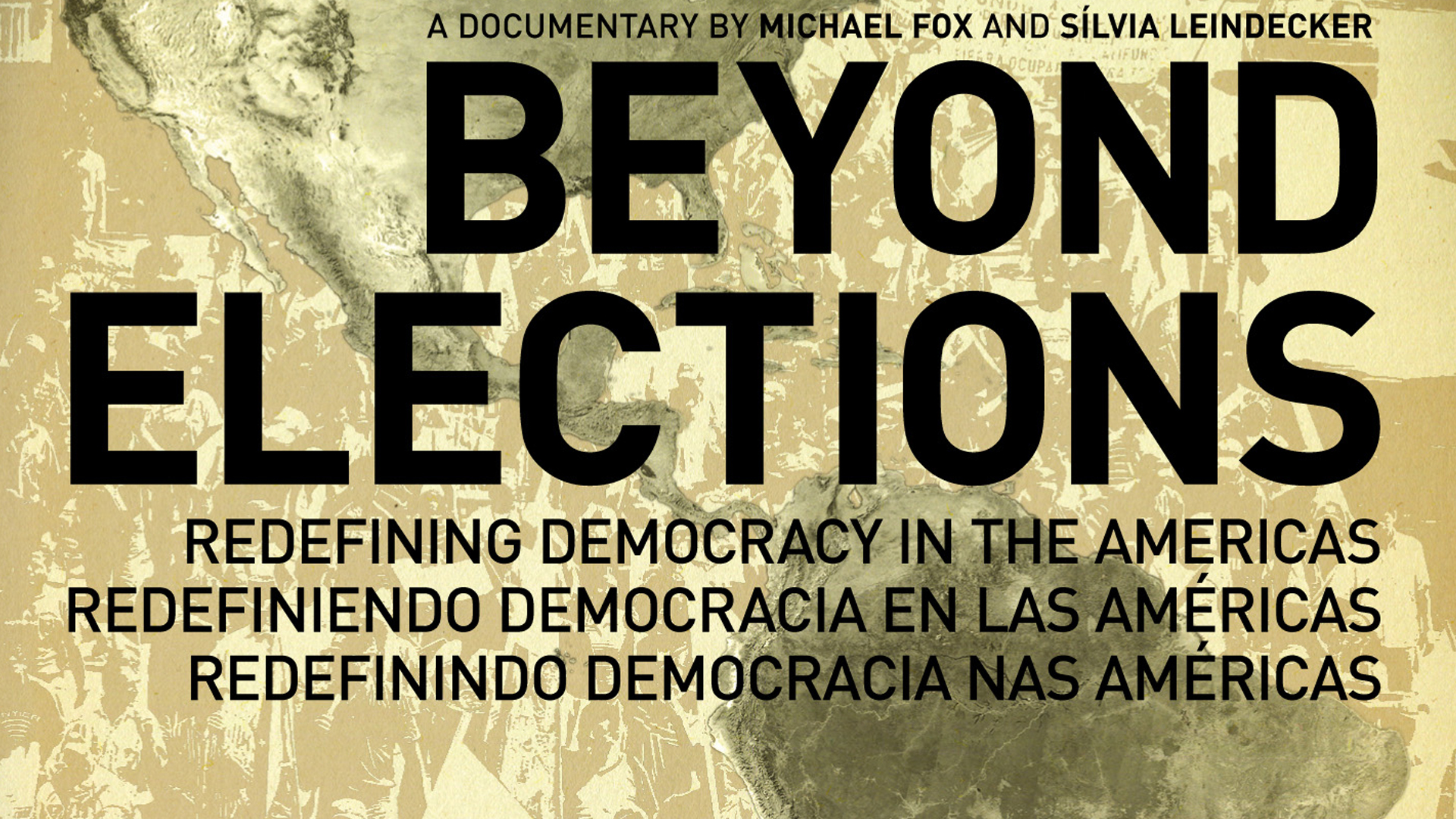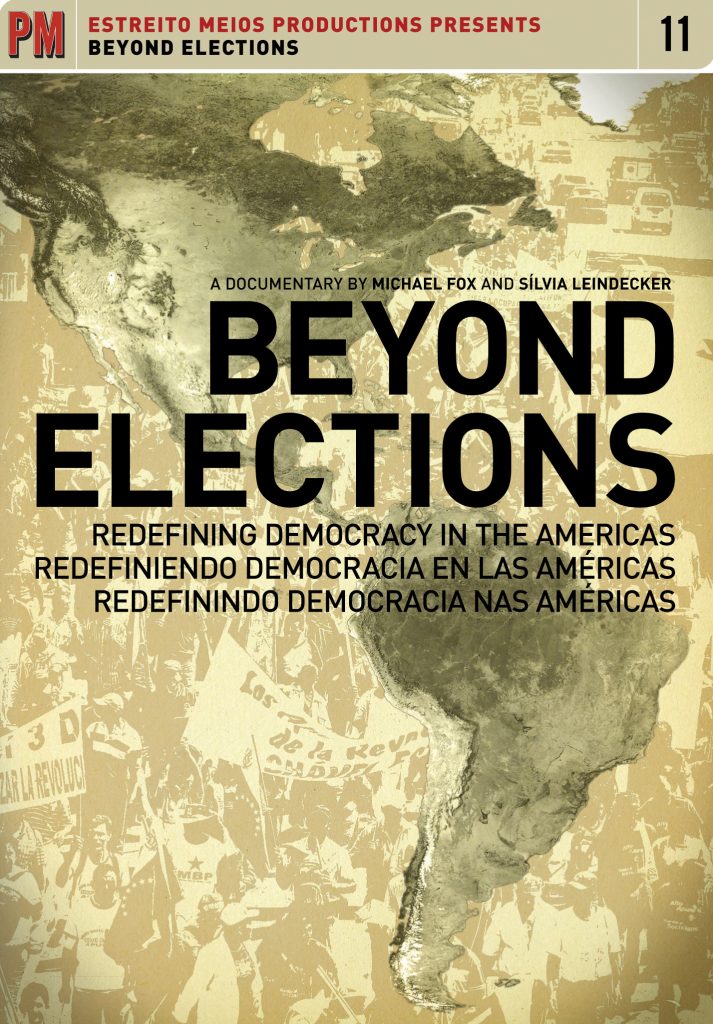By Todd Miller
nacla.org
After the midterm elections in November, headlines throughout the United States trumpeted the news of the great Republican comeback. The voters had spoken, and once again it was time to go home and wait until the next opportunity to vote. But what if elections weren’t the exclusive focus of democratic practice? Anyone interested in the question of radical democracy, more in practice than in theory, would do well to watch Beyond Elections. The documentary turns to the urban neighborhoods, rural communities, immigrant organizations, and worker collectives that span the Americas, from Argentina to the Bronx—all of them experimenting with collective decision making in the spaces where they live and work.
The filmmakers travel to many of the same places that Oliver Stone covered in his documentary South of the Border (2009), and their film serves as a good supplement to Stone’s depiction of the Latin American left. Call it South of the Ballot Box: Unlike Stone’s documentary, which is dominated by exclusive interviews with presidents from the region, Beyond Elections focuses on ordinary people, particularly those involved in social movements and organized communities and neighborhoods—the very force of people who brought left-leaning leaders to power to begin with. Democratic practice in this documentary is an everyday affair, involving countless meetings, assemblies, conversations, and arguments.
The film begins in Porto Alegre, Brazil, where community-based assemblies decide on public budgets. Started in 1989, participatory budgeting in Porto Alegre—also the home of the World Social Forum—is a process by which ordinary citizens identify and prioritize community needs such as housing, economic development, infrastructure, health, recreation, and culture, and help allocate public funds to address those needs. Budgets are hammered out not in board rooms, but assembly halls. It isn’t always pretty. These assemblies often bring together more than 1,000 people into crowded assembly halls and gyms and things often get raucous and emotional as communities debate the most pressing and sometimes divisive issues.
The next stop is Venezuela, where the film looks at the communal councils established by federal law in 2006. Since then, tens of thousands of such councils have been established in the country, and critical decisions about projects and development plans are made at a neighborhood level in citizen assemblies, optimally by consensus, however voting is often used. Community spokespeople to carry out the projects are also elected in these meetings, which can involve the participation of as many as 150 people drawing from 400 families in any given area.
Like Brazil’s participatory-budget assemblies, Venezuela’s communal councils are elected within neighborhoods and directly oversee policies, projects, cooperatives, and work committees, while coordinating with and receiving funding directly from different levels of government. “We are the ones who know the problems in our community,” says Cecilia Rodríguez, a communal council member from Caracas, “so who better than us to organize the community and to improve our community and do our own projects?” The film’s coverage of this localized version of participatory democracy, promoted by the Venezuelan federal government, offers a good dose of nuance to the North American view of Venezuela as autocratic.
Beyond Elections also examines labor democracy. Borrowing footage from The Take (2004), Naomi Klein and Avi Lewis’s film about an Argentine work cooperative, it documents factories taken over by workers, who not only share the work of managing the factory but also the profits. “We’ve formed a democratic business,” says José Abellí, a leader in the recuperated factory movement in Argentina, “a business of people, not capital.” In New York, the filmmakers talk to the Green Worker Cooperatives in the South Bronx, which are geared toward creating worker-owned and environmentally friendly cooperatives as a response to the area’s chronically high unemployment and history of environmental racism. The filmmakers also interview members of immigrant organizations such as the Movement for Justice in El Barrio, which started by fighting gentrification in the East Harlem neighborhood in New York, but now are confronting some of their most difficult problems in the United States—particularly draconian immigration laws, low wages, and wage theft.
While most Latin American countries have had electoral democracies at least since the 1990s, “people really didn’t have real decision-making power—not for the future, not in the planning, nor in the development of the country,” according to Venezuelan Adalnel Pantoja, community social worker for the Caracas mayor’s office. But now many communities, towns, cities, and even countries have sought not to reject electoral democracy, but to move beyond it and build people power—what they insist is true democracy. This is inevitably a small-scale effort, at least for now. As Brazilian political science professor Leonardo Avritzer says in the film: “The question today in the southern countries is how to think about the democratization of things like the budget, health policies, education policies, urban policies, and the democratization of life where you live.”
Beyond Elections plunges into the rowdy realm of popular democracy, where opinions clash and people take the idea of consensus so seriously that they are willing to engage in long, painstaking meetings. The filmmakers omit no opinions from the debates they cover, taking the time to show participants explaining the projects under discussion, providing very little narration. The film reflects the ambitious vision of the democracy it depicts, making the film rather lengthy, almost two hours. Although the film sprawls a bit, this is also the film’s beauty—the close attention it pays to the wide-spanning locales where new concepts of democracy are arising and being worked out.
In doing so, comparisons with U.S. notions of democracy are inevitable. Without describing the U.S. political system in much detail as a point of comparison, the film will nonetheless come across as a critique of it. Electoral democracy, so triumphantly glorified and even promoted abroad, is not only insufficient but also a betrayal of democracy “in the name of democracy,” as Uruguayan writer Eduardo Galeano says in the film. Indeed, the United States has created a monopoly on the definition of democracy, says Portuguese sociologist Boaventura de Sousa Santos. “But in reality,” he says, “democracy is a work in progress.”







